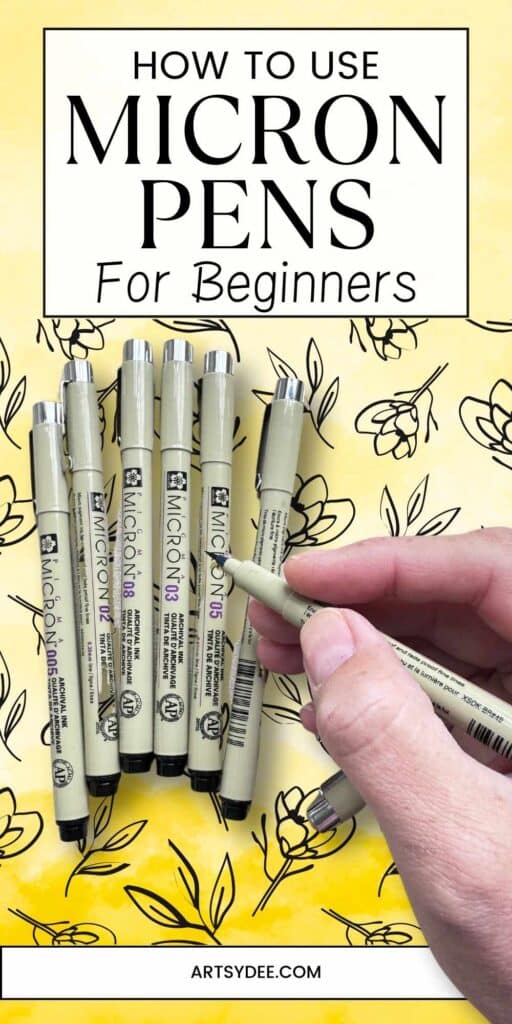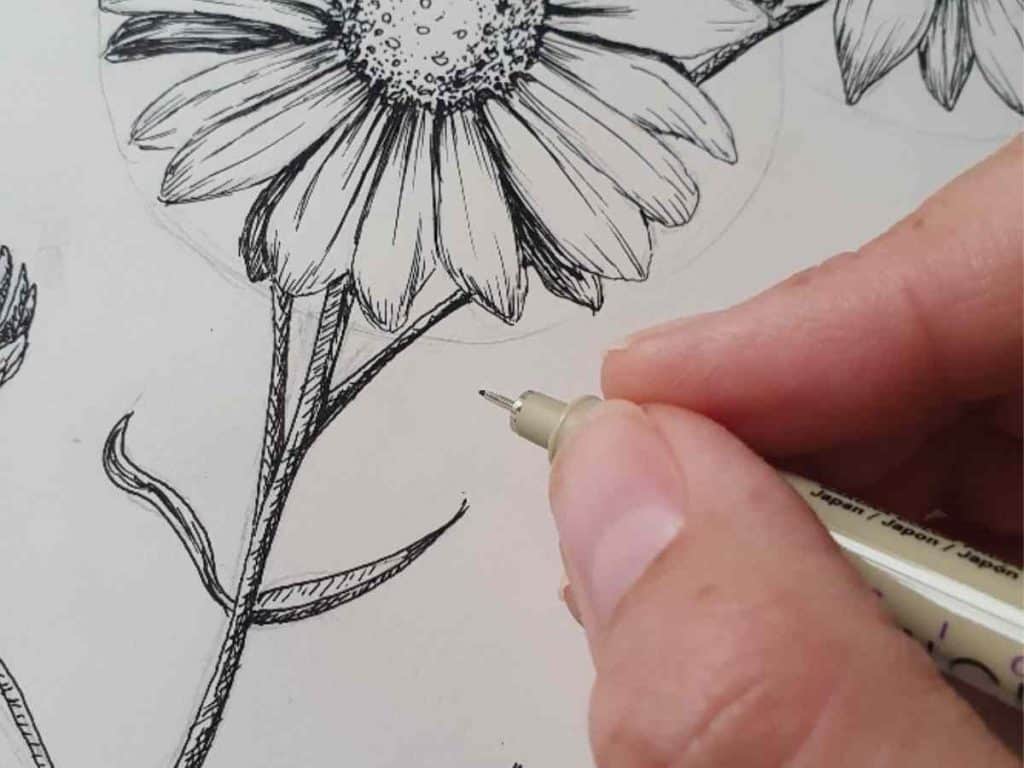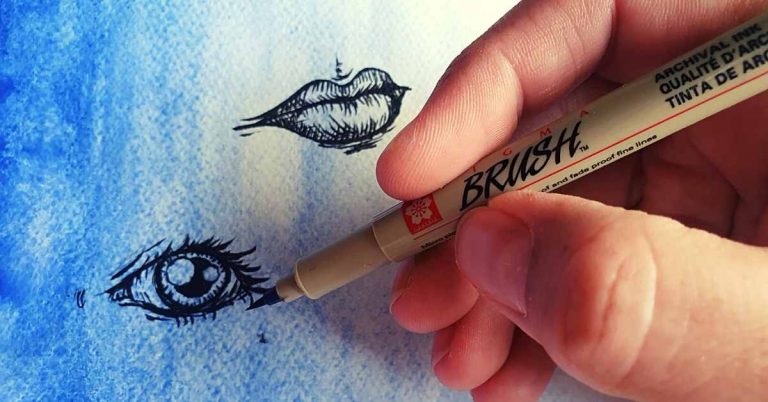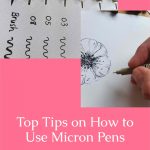Last Updated on August 13, 2024 by Dee
Micron pens are arguably the most popular choice for lettering and drawing. They come in various sizes, and colors and can be found at just about any art supply store. But how do you use them? What tips can you give to someone who is just starting with micron pens? Here are 12 top tips & tricks on how to use micron pens and some creative micron pen drawing ideas to help get your creative juices flowing!
Wondering How to Use Micron Pens?
Table of Contents

12 Top Tips for How to Use Micron Pens!
**This page may contain affiliate links to products I have used or recommended. If you purchase something from this page, I may receive a small percentage of the sale at no extra cost to you.**
1. Firm Grip
Hold your micron pen firmly without putting too much pressure on the nib. Try to center it between your thumb and forefinger when writing. The micron pen should glide across the paper surface, creating crisp, clean, and professional line work.
2. Shorter Linework
Try to draw using shorter linework so that the nib lasts longer. Often drawing out long, continuous lines can cause clogging of the nibs.
3. Dry Paint Before Pen Work
Use micron pens under or over watercolor washes for pen and wash illustrations – but always make sure the paint is dry.
4. Test Nibs
Test out your pen nib sizes before you begin on a piece of scrap paper. This helps you to get a good idea of the line weight and what it will look like in your drawing.
5. Replace Nibs
They are considered disposable pens because you do not get refills, but you can replace a nib as long as you have a spare one.
6. Use the Right Paper
Draw on smooth, high-quality paper that is meant for pen drawing or writing. If the page feels rough and the nibs get stuck, it’s not a good surface to draw on with your micron pens.
7. Write at an Angle
It helps to write at an angle when using fine-tip pens like microns so that they don’t clog up with extra ink buildup.
8. Micron pens for Expressionistic Line
Micron pens are great for starting out on your drawings because they create strong, expressionistic line work.
9. Not too Much Pressure
Don’t apply too much pressure to the nib while drawing.
11. Combine Mediums
Add color or shading by combining the pen ink with watercolors, ink washes, or liquid acrylics.
10. Shake it!
Don’t forget to shake your pen before each use.
11. Scribble for Smoothness
To make the ink flow smoother, scribble on scrap paper with the micron pen for about 10 seconds.
12. Store Correctly
Try to store your micron pens in a cool, dry place to lengthen their lifespan.
Where To Buy Micron Pens & Other Essential Art Supplies for Drawing…
If you are looking to buy Micron pens click on the Micron pen sets below to order them online 👇 There are a variety of sets available, and here are a few of my personal recommendations to suit different needs and budgets:
- Micron Beginners Set: This Micron 6-Piece Pen Set is a fantastic starting point. It includes a range of essential nib sizes (005, 01, 02, 03, 05, and 08) to explore different line weights and techniques, all at an affordable price.
- Micron Pen Wider Range: The Micron 10-Piece Graphic Pen Set offers a wider variety of nib sizes, including the super-fine 003 and brush tip for added versatility. It’s ideal for those looking to expand their artistic capabilities.
- Add a Splash of Vibrancy to Your Artwork! The Sakura Pigma Micron Pigment Fineliners – Pack of 4-0.8mm brings a rainbow of possibilities to your creative projects. This set includes classic black, plus bold blue, fiery red, and earthy green, all with a consistent 0.8mm tip for smooth, expressive lines. Great for sketching, journaling, or adding pops of color to your illustrations, these archival-quality pens are vibrant, fade-resistant and they don’t bleed or feather.
- Watercolors: Windsor & Newton is a reputable brand that offers high-quality watercolor paints that work beautiful both underneath and on top of Micron Pen drawing. You can choose from their range of professional-grade watercolor tubes or pans, depending on your preference.
- Watercolor Paper: Look for cold-pressed, 140lb (300gsm) watercolor paper for the best results with micron pen and watercolor. This type of paper is durable and has a nice texture that’s ideal for watercolor painting.
- Brushes: A selection of round and flat brushes in various sizes will give you the versatility you need for different strokes and details. Sable or synthetic brushes designed for watercolor will give you the best performance.
- Palette: A mixing palette with wells for both mixing and holding your paints is essential. It can be a simple plastic one or a porcelain palette for a more luxurious feel.
- Graphite Pencils: This set of Prismacolor graphite pencils are fabulous to use. They feel lovely on paper and whether you’re sketching out a new concept or adding depth and detail to a drawing, these pencils will help you bring your vision to life.
- Color Pencils: Faber-Castell Polychromos provide a range of vibrant colors and are known for their high-quality pigments and smooth application alongside micron pen drawing.
- Kneaded Eraser: The Prismacolor Kneaded Rubber Eraser is flexible and can be shaped for precision erasing, creating highlights, or lightening your color pencil work.
- Markers: We use the Ohuhu alcohol markers which have a fantastic range of colors and are lovely to use with Micron Pen sketching.
- Metallic and Fluorescent Pencils: To add some unique effects to your artwork, Caran d’Ache has a range of metallic and fluorescent pencils that can bring a special touch to your drawings.
- Art Stumps and Tortillons: For more controlled blending, especially in smaller areas, art stumps and tortillons made of compressed paper can be very useful.
- Pencil Extenders: As pencils get shorter, a pencil extender can help you hold onto them comfortably and use them until the very end. This Pencil Extender Set is a great option.
- Art Supply Pencil Case: Keep your pencils organized and protected with a durable case.
Each of these products has been a part of our artistic process at Artsydee, contributing to the creation of beautiful and lasting artwork. By investing in quality materials, you ensure that each stroke of your pencil is as rewarding as the last. Happy drawing!
“Doodling has become a profession, with many artists becoming full-time doodlers.”
Some artists have probably used micron pens for more than a decade.

Companies like Google, Vans, and many more, use Micron pens to design illustrations on their products and social media.
[Wondering How to Find Your Art Style? Read this blog post!]
Micron Pen Nib Sizes
Micron Nib Size Reference Chart

Thousands of artists all over the world rely on micron pens to create their masterpieces.
If you love intricate drawing, calligraphy, or graphic design, this is a pen for you.
Now that we’ve touched on how to use micron pens let’s get into choosing the best size!
Micron Pen Common Sizes
.005 – This is the most popular size for micron pens because the line it produces is very thin and almost weightless.
0.1 – This pen’s nib produces lines that are quite a bit thicker than the .005 but still retains precision.
0.3 – If you want to draw with dark, thick lines, this is your pen!
0.35 – This pen gives off thicker and darker lines than the .3 but still retains precision.
0.5 – This is a great pen if you want to add more detail and depth to your drawings!
0 .8 -1.0 mm pens give off an even thicker line weight than the .5, so these are great for mixing colors and giving off more detail into your drawings.
1.15 mm and up are usually used by comic artists, but you can still use them in graphic design for added punch!
Micron Pen Brush Tip offers a beautiful line for calligraphy and lettering and can also create whimsical line drawings.

What can you use Micron Pens for?
- Use Micron Pens for Calligraphy: Calligraphy is the art of beautiful handwriting, which can be as simple or elaborate as you want it to be. The best way to learn how to do calligraphy is by doing a lot of lettering practice!
- Try different pens and keep experimenting until you find the one that works best for you.
- Use Micron Pens To Write Poetry
- Writing poetry is a very relaxing activity that can be done anywhere and at anytime. Writing in small, precise letters on high-quality paper will make your poems even more beautiful!
- Sketch with Micron Pens: Micron pens are great for creating very fine lines or details in drawings.
- They can also be used to create a value study before painting, which is something you should always do when starting on a new painting. By doing a value study, you can imagine how each of your color tones will look before applying paint to the canvas.
- Use Micron Pens For Coloring: Coloring intricate coloring pages requires a fine nib! This is why micron pens are always a safe option! They’re great for coloring complicated line drawing and coloring books too.
- Use Micron Pens For Graphic Design: Micron pens are great for creating designs that require precision and sharp edges. The best part about using micron pens for graphic design is how easy it is to create perfect lines and clean shapes.
- Use Micron Pens for Contour Line Drawing: Contour Drawings are drawings that are composed entirely of line. The line gives the viewer an idea of where the various surface planes of the subject lie, and importantly, defines the outline.
- Use Micron Pens To Draw Anime Figures: To create a good anime drawing, you need to practice how to use micron pens. They’re great for creating intricate lines and details and are also used for rendering people in the manga style because of how detailed the linework can be.

Micron Pen Art
Here are some examples of the beautiful and refined art you can create with Micron pens, fine liner pens, or just standard ballpoint pens.
Waterproof v/s Watersoluble
Maybe you’re into drawing comics? Manga? Urban sketching with a watercolor wash? Mixed media art journaling?
For all of the art processes above, choosing a waterproof pen matters!
What is waterproof ink?
Waterproof ink will not smear, which means it’s excellent for using with mixed-media and watercolor painting.
What is water-soluble ink?
Water-soluble ink will dissolve once it touches water.
Microns come with both types of inks, and you should choose the right one based on how you plan to use them.

How Should you Store Your Micron Pens?
Store in a cool, dry place. Micron pens tend to leak when overheated (like if you have left them on the back seat of your car.) If you are using microns, keep them in a cool, dry place to prevent this from happening. Store them with their caps on. Do not leave them in hot places or in direct sunlight.
[Take a look at the Best Pencil Cases for Artists for some great storage solutions for your Micron Pens and other stationery!]
Micron pens are waterproof and have archival quality with up to 100 years of lightfastness. If you plan on doing a watercolor wash, you must make sure your watercolor is 100% dry on the paper before you use your Micron pen. Or, if you are using watercolor washes on top of a Micron Pen, then make sure your micron ink is 100% dry.
Micron pens are the highest quality, most precise pen available in the market. They give you a lot of control while writing, and they are great for calligraphy or any other fine art that involves detailing your work. They also should not be confused with markers because they don’t provide the same broad strokes. While markers can make light work of large areas, microns are much more suited to intricate drawing.

The history of Sakura Pigma Micron pen
Sakura Color Products Corporation of Osaka, Japan, established an American subsidiary in 1986. Sakura developed a crayon in 1921 and was the first company to establish oil-pastel or Cray-Pas.
With regards to ink, Sakura developed the technology to break down the particles in pigments to pass through ultra-narrow nibs. The development of the Sakura Pigma Pen was aimed at architects and others involved in drafting work. In 2002 the company established a subsidiary in China Shanghai Sakura International Trading Co., Ltd. In 1986, the company set up a subsidiary in America, Sakura Color Products of America, Inc.

Some other FAQ about Micron Pens
Do microns work on glass?
No, micron pens will not work on glass.
How do I refill my micron pen?
Most micron pens come with a small, disposable needle tip. When you’re ready to refill the pen, use craft pliers to pull off the nib. Fill an eye dropper with India ink and squeeze the ink into the pen. This is a great way to continue using your micron pens after the ink has dried up.
[Related Post: A List of the Best Junk Journal Supplies]
Are Micron pens permanent?
Yes, how to use micron pens are permanent! They’re an excellent option for artists who enjoy pen drawing, lettering, and mixed media.
One of the best things about micron pens is that they are relatively inexpensive but still high quality. If you’re just starting out with lettering and drawing, I recommend trying a few different sizes (0.1mm, 0.35mm) to see which one works better for your creative needs before investing in an entire set.
Conclusion
You can find them at almost any art supply store and online. If you have questions on how to use micron pens or want to know more about what my favorite tips and tricks are when it comes to these popular pens, drop me a message below! I’m always happy to help get your creative juices flowing!
Other articles you may enjoy…
How to create the illusion of depth in art!
Let’s Explore Pen Ink & Watercolor
The Best Digital Painting Tips
The Low Down on Drawing Upside Down































































Has anyone ever reported successfully using micron pens for quilt labels?
I have not personally used them on fabric, however, http://www.theQuiltshow.com says: “Pigma® Micron ink pens are perfect for drawing fine details on your quilt, decorating fabric, making quilt labels, and any application where you need a fine, accurate way to permanently mark on fabric.”
Yes, they can be used on quilts. I made a quilt for my grand-daughter when she was born. She is now 13. The quilt featured blocks of her genealogy on all 4 sides of the family done with a Pigma micron pen.. The quilt has been washed many times over the last 13 years and the lettering is still very legible. My friend also used Pigma pens for her quilt labels with good success.
Thanks so much for this feedback!
Can these be used to create quilt labels on fabric?
I love 005 but I typically get to use them once before they stop working. I don’t have heavy pressureso I don’t know what Im doing wrong
Yes it’s because its a very tiny nib. Definitely spend some time shaking your pen to get the ink flow into the nib and also scribble on a scrap piece of paper. Store your pen horizontally so that the ink doesnt dry out in the nib. Hope this helps!